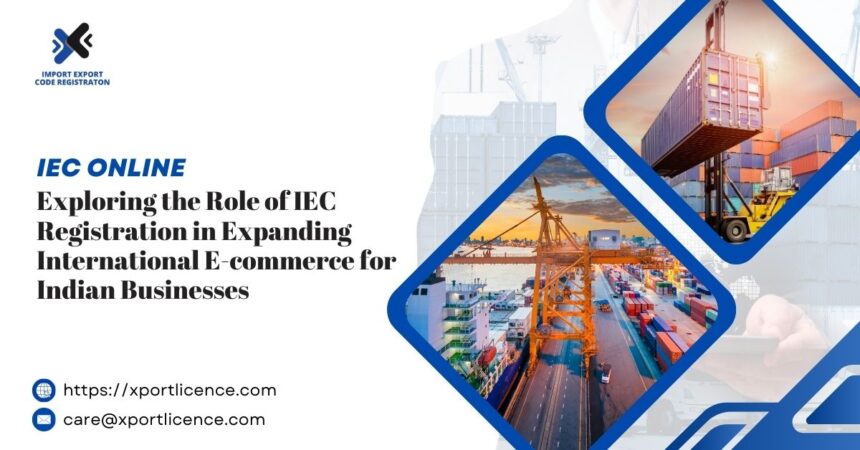In today’s globalized world, cross-border trade has become a key growth strategy for businesses of all sizes. With the rapid rise of e-commerce, international markets are more accessible than ever before, providing countless opportunities for businesses to expand beyond their domestic borders. However, to fully engage in international trade, Indian businesses must comply with certain regulatory requirements, one of the most critical being the Import Export Code (IEC) registration.
While IEC registration is often discussed in the context of traditional import-export activities, its importance in enabling Indian businesses to participate in international e-commerce has been somewhat overlooked. This article explores the critical role IEC registration plays in helping Indian businesses tap into the global e-commerce market, highlighting its benefits, the challenges of expanding globally, and how businesses can leverage IEC registration to streamline their international operations.
What is IEC Registration?
IEC registration is a mandatory requirement for any Indian business involved in importing or exporting goods and services. Issued by the Directorate General of Foreign Trade (DGFT), an IEC is a 10-digit code that serves as a unique identifier for businesses in their cross-border transactions. Without an IEC, companies are restricted from engaging in international trade.
Traditionally, IEC registration was seen as a tool for large companies involved in bulk imports and exports. However, the rise of e-commerce has transformed the business landscape, allowing even small and medium-sized enterprises (SMEs) to explore international markets. Whether a business is selling physical goods or digital services, IEC registration is essential for participating in global e-commerce.
The Evolution of Global E-commerce and Indian Businesses
The rise of e-commerce has been a game-changer for businesses worldwide. Global platforms like Amazon, eBay, and Alibaba have enabled Indian businesses, even those operating in remote areas, to reach customers across the globe. E-commerce eliminates many barriers to entry in international markets, making it easier for businesses to sell their products and services online.
However, as more Indian companies venture into the global e-commerce space, they encounter new regulatory and compliance challenges. For any business wishing to sell products abroad—whether through its own website or a third-party platform—IEC registration becomes a fundamental requirement. It allows businesses to manage their international transactions seamlessly and ensures they comply with foreign trade policies.
Why IEC Registration is Crucial for International E-commerce
There are several reasons why IEC registration is a key enabler for Indian businesses in the e-commerce space:
Simplifies Cross-border Transactions:- For businesses engaged in global e-commerce, conducting international transactions is a routine part of operations. Without an IEC, these transactions cannot be legally processed. An IEC code allows businesses to receive payments in foreign currencies, manage customs documentation, and ensure their transactions comply with legal requirements.
Opens Access to Global Markets:- IEC registration is the first step for Indian businesses seeking to access international markets. Whether through e-commerce platforms or direct trade, having an IEC code is a legal necessity for exporting goods or services. This becomes particularly crucial for businesses looking to establish a global customer base, as it enables them to ship goods overseas and participate in international supply chains.
Facilitates Collaboration with International Partners:- In the global e-commerce space, businesses often need to collaborate with international partners, whether suppliers, manufacturers, or logistics providers. Having an IEC code simplifies these interactions, as it demonstrates that the business is authorized to engage in cross-border trade. This can enhance trust and credibility with international partners, facilitating smoother business relationships.
Enables Access to Government Incentives:- Indian businesses registered under IEC can benefit from various government schemes and incentives aimed at promoting exports. The Indian government has introduced programs like the Merchandise Exports from India Scheme (MEIS) and Service Exports from India Scheme (SEIS) to encourage businesses to expand globally. These incentives offer tax benefits, subsidies, and other financial support that can significantly reduce the cost of doing business internationally.
Key Benefits of IEC Registration for E-commerce Businesses
For Indian businesses operating in the e-commerce space, IEC registration provides several key advantages:
Legitimacy and Compliance:- IEC registration ensures that a business is legally compliant with the rules and regulations governing international trade. This adds credibility to the business, helping to build trust with foreign customers, suppliers, and partners. Being IEC-registered also reduces the risk of facing penalties or delays at customs checkpoints, which can disrupt the smooth flow of goods and services.
Seamless Payment Processing:- One of the biggest challenges for e-commerce businesses selling internationally is handling payments in foreign currencies. IEC registration simplifies this process by enabling businesses to open foreign currency accounts and receive payments in various currencies. This not only streamlines financial operations but also makes it easier for businesses to attract international customers who prefer to pay in their local currency.
Access to International Shipping and Logistics Services:- Global e-commerce requires efficient shipping and logistics solutions to ensure that products reach customers on time. IEC registration enables businesses to work with international shipping and logistics providers, allowing them to ship goods across borders with ease. Many global logistics companies and couriers require an IEC code to process international shipments, making it an essential component of cross-border e-commerce.
Participation in Global Trade Shows and Events:- For businesses looking to expand their international presence, participating in global trade shows and events can be an effective way to showcase products and build relationships with potential buyers. IEC registration enables businesses to export sample products and promotional materials to such events, helping them tap into new markets and opportunities.
Note: Click here to update your IEC Code today – Update IEC Code Online
Conclusion
In the era of global e-commerce, IEC registration is no longer just a requirement for traditional import-export businesses. It is a crucial enabler for Indian companies looking to expand their reach and tap into the global marketplace. By registering for an IEC, businesses can not only comply with international trade regulations but also unlock a wealth of opportunities in the global e-commerce ecosystem. From simplifying cross-border transactions to accessing government incentives and building partnerships with international players, IEC registration empowers Indian businesses to compete on the global stage. As the world becomes more interconnected, Indian entrepreneurs must embrace this regulatory tool to ensure their success in the fast-growing world of international e-commerce.







